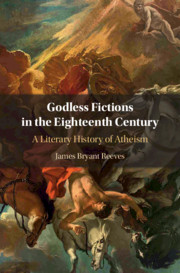Book contents
- Godless Fictions in the Eighteenth Century
- Godless Fictions in the Eighteenth Century
- Copyright page
- Contents
- Acknowledgments
- Introduction
- Chapter 1 A Complete System of Atheism: Jonathan Swift
- Chapter 2 Godless Dunces: Alexander Pope
- Chapter 3 The Limits of Self: Sarah Fielding
- Chapter 4 Gender and the Orient: Phebe Gibbes
- Chapter 5 Ecumenical Poetics: William Cowper
- Coda
- Notes
- Bibliography
- Index
Chapter 1 - A Complete System of Atheism: Jonathan Swift
Published online by Cambridge University Press: 06 August 2020
- Godless Fictions in the Eighteenth Century
- Godless Fictions in the Eighteenth Century
- Copyright page
- Contents
- Acknowledgments
- Introduction
- Chapter 1 A Complete System of Atheism: Jonathan Swift
- Chapter 2 Godless Dunces: Alexander Pope
- Chapter 3 The Limits of Self: Sarah Fielding
- Chapter 4 Gender and the Orient: Phebe Gibbes
- Chapter 5 Ecumenical Poetics: William Cowper
- Coda
- Notes
- Bibliography
- Index
Summary
This chapter argues that Jonathan Swift’s satires depict godless worlds dominated by atheists. First, I provide brief readings of the “Ode to the Athenian Society” (1692), The Sentiments of a Church-of-England Man (1708), the “Letter to a Young Gentleman, Lately entered into Holy Orders” (1720), and Swift’s published sermons. Then, I demonstrate how Swift’s major satires oppose atheism not by arguing against it but by paradoxically taking its premises for granted. A Tale of a Tub (1704), the Argument Against Abolishing Christianity (1708), Gulliver’s Travels (1726), and A Modest Proposal (1729), for instance, all present counterfactual, dystopian worlds in which all reality is reducible to matter alone. I conclude the chapter by arguing that, when atheism is Swift’s satiric target, his satires demonstrate a considerable amount of compassion and understanding for groups he typically presents as detestable. From the Turks of An Argument Against Abolishing Christianity, to the Irish Catholics of A Modest Proposal, to the Jews, Turks, and “Bonzes in China” of Mr C-Ns’s Discourse, atheism incites Swift to abandon his animosity against various religious groups and social classes.
- Type
- Chapter
- Information
- Godless Fictions in the Eighteenth CenturyA Literary History of Atheism, pp. 22 - 72Publisher: Cambridge University PressPrint publication year: 2020

